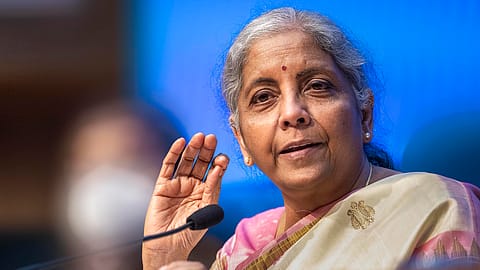Centre to bear burden of excise duty cut on petrol, diesel: Nirmala Sitharaman
Basic excise duty which is shared with states has not been touched, says FM.

Finance minister Nirmala Sitharaman on Sunday clarified that the excise duty cut of ₹8 per litre on petrol and ₹6 per litre on diesel has entirely been made in the Road and Infrastructure Cess (RIC) – which is not shareable with states.
Basic excise duty which is shared with states has not been touched, Sitharaman said. "Therefore, the entire burden of these two duty cuts is borne by the Centre," the finance minister added.
In November last year, the government had cut central taxes on petrol by ₹5 per litre and diesel by ₹10 per litre. The reduction was made entirely in the Road and Infrastructure Cess at the time.
"The duty reduction made yesterday has an implication of ₹1,00,000 crore a year for Centre. The duty reduction made in November 2021 has an implication of ₹1,20,000 crore a year for Centre. Total revenue implication to Centre, on these two duty cuts is thus ₹2,20,000 crore a year," the finance minister said.
In an effort to control soaring inflation, the central government on Saturday announced a big reduction in the central excise duty on petrol and diesel.
Following the Centre's move, the Maharashtra government slashed value added tax (VAT) on petrol and diesel by ₹2.08 and ₹1.44 per litre, respectively. In various districts of Maharashtra, petrol prices had breached the ₹120 per litre mark before the tax cut. The highest petrol price in the country was in the Parbhani district of the state.
Rising fuel prices in India due to high crude oil prices have led to a debate on which government, state or central, should be lowering their taxes to keep prices under control.
Recommended Stories
India imports around 86% of its annual crude oil requirement. Brent crude – the international benchmark – is hovering around $110 a barrel amid the Russia-Ukraine war. A stronger U.S. dollar has added to the cost of crude oil.
Last week, Fortune India reported that the price of one litre of petrol in India is dearer than most neighbouring countries like Nepal, Pakistan, and Bangladesh. Petrol prices in India, however, are cheaper than developed countries like the U.K., Germany, and France among others.
In a series of tweets, Sitharaman, citing RBI data, said that the Narendra Modi government incurred developmental expenditure worth ₹90.9 lakh crore during 2014 to 2022. “In contrast, only ₹49.2 lakh crore was spent on developmental expenditure during 2004-2014,” she said.
The expenditure incurred by the Narendra Modi government includes ₹24.85 lakh crore spent so far on food, fuel and fertiliser subsidies and ₹26.3 lakh crore on capital creation, the finance minister said. “Over the 10 years of UPA, only ₹13.9 lakh crore was spent on subsidies,” she added.
(INR CR)